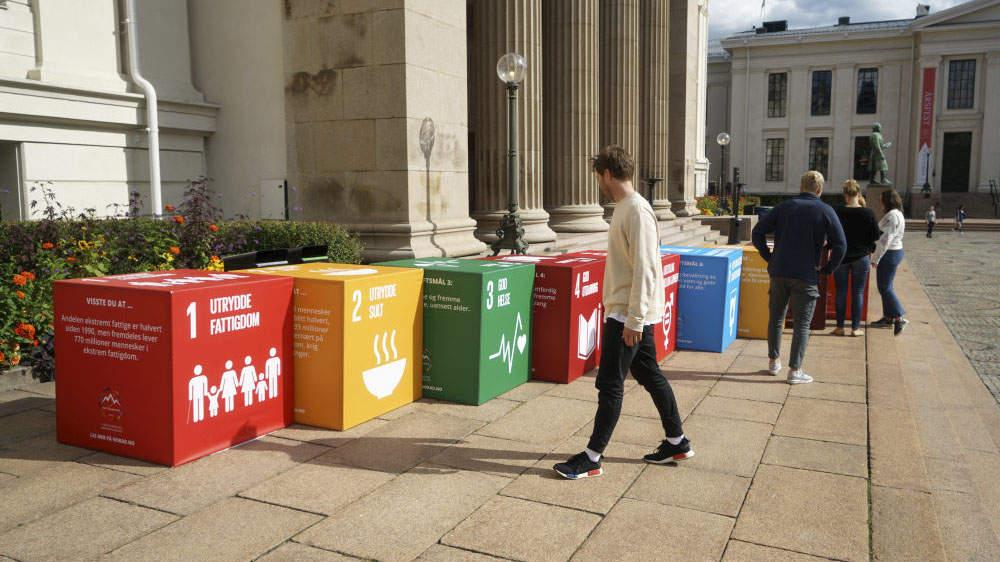The seminar presented various examples of how the different departments are working to achieve the UN's Sustainable Development Goals (SDGs) today. The presentations also helped to generate discussion and input on how the faculty can work even better in order to achieve the SDGs. And the faculty has great potential for improvement, according to an informal vote conducted among the participants.
- All health is global!
In his speech, Ole Petter Ottersen argued that the term "global health" should be superfluous.
- All health is global! If this was not clear before, at least the pandemic has emphasized that health is a cross-sectoral issue, and that we need a global transformation for health, Ottersen explained.
Ottersen also pointed out that it is the duty of science to help solve the challenges we face today, since science has contributed to creating many of them.
Ole Petter Ottersen is the former rector of UiO, former president of Karolinska Institutet and the current chairman of the Sustainable Health Unit’s Advisory Board.
Education just as important as research in solving sustainability challenges
- One of the most important issues in creating sustainable education, is to include the students' perspectives in all aspects of education and research. We need students to be involved in shaping both the education and the research we conduct, explained Lisbeth Brevik. Brevik is a professor at the Department of Teacher Education and School Research at UiO and Academic Chair of the Circle U. European University Alliance.
Brevik led the development of a European report on sustainable education on behalf of Circle U. In this report, the authors asked two questions related to sustainable education. First, what does an education for a sustainable world look like? And second, what type of education is necessary to equip students with the skills required to contribute to a sustainable world?
The report showed that it is important to link education, research and innovation. In order to create sustainable education, there is a need for student-led initiatives that are based on fruitful collaboration between teachers and students. In addition, the initiatives must have the support from the university's management.
Sustainable health
- It is high time for the faculty to put global sustainability on the agenda. The Centre for Sustainable Healthcare Education (SHE) has been working to include these perspectives in health education and research for a long time. We are pleased to see that our work is showing results and that these topics are being highlighted, said Eivind Engebretsen.
Engebretsen explained how SHE is including sustainability in the education of healthcare professionals through initiatives such as a new honours certificates for master students in education for sustainable development. He agreed with Brevik that student participation and critical thinking are crucial in order to succeed.
- Through the establishment of SUSTAINIT, we are poised to create an even more robust platform for raising awareness about global health and sustainability challenges, Engebretsen continued.
Eivind Engebretsen is head of the Center for Sustainable Healthcare Education (SHE) and head of the Sustainable Health Unit (SUSTAINIT).
The SDGs can improve research
- The new language we get through the SDGs can help to improve my research, said Annetine Staff, Professor of Obstetrics and Gynecology at the Institute of Clinical Medicine.
Representatives from the Institute of Clinical Medicine, the Institute of Basic Medical Sciences and the Institute of Health and Society showed examples of how they are currently working towards the SDGs. Several of the representatives emphasized that they still have room for improvement.
Staff spontaneously invited Engebretsen to join the effort to include the SDGs in her part of the medical education, module 6.
- We would love to be included wherever we are wanted! Much of our work at SHE can certainly be translated and further developed to increase the sustainability focus in various parts of medical education and research. Spontaneous initiatives and invitations like this show why it is so important that we continue to put sustainability on the agenda and that we are given a platform to showcase how this can be done, said Engebretsen.
Sustainability in all curricula
- I would like to challenge each individual staff member to rethink their subjects; how can you incorporate the SDGs into your teaching? asked Magnus Løberg, Pro-Dean of Studies at the Faculty of Medicine.
This was his response when asked how to fit the SDGs into an already packed medical curriculum. He explained that it would probably be difficult to create any new "sustainability subjects" in the medical program:
- The curriculum is already so packed that it is not possible to add more subjects. I also believe that it is a much better solution to incorporate the sustainability perspective into the existing subjects rather than creating new ones, Løberg explained.
